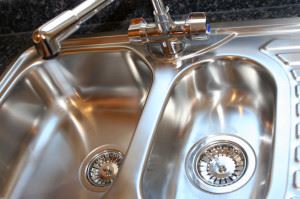
FOG cause clogged drains and sewage backup because they block the flow of water. Even though they appear harmless to pour down the drain as a liquid, fats, oils, and grease actually separate from water and stick to pipe walls, building up each time. That’s when you notice your sink draining slowly, odors starting to form, and eventually, one or more drains backing up.
What to know:
- Soap breaks up grease but loses its effectiveness when poured down the drain, so grease can still solidify on pipe walls.
- Hot water does not help break up grease- when the water eventually cools, grease becomes solid again.
- Cooking oil floats on water and sticks to pipes, so it’s best to avoid pouring any oil down the drain at all.
What to do:
- Pour oils and grease at room temperature into old containers (milk, water bottles, jars), seal them, and throw them in the trash.
- Scrape food, fats, grease, etc. from plates and utensils into the trash before rinsing or washing them in the sink or dishwasher.
- Use a strainer in the sink to catch any remaining food particles.
Keeping FOG out of your kitchen sink can help you to avoid drain clogs and backup. You may still be in need of drain cleaning in other sinks in your home where things like hair and soap commonly cause clogs and odor, too. In general, routine drain cleaning is a good idea to keep sinks flowing smoothly and functioning properly throughout your home.





